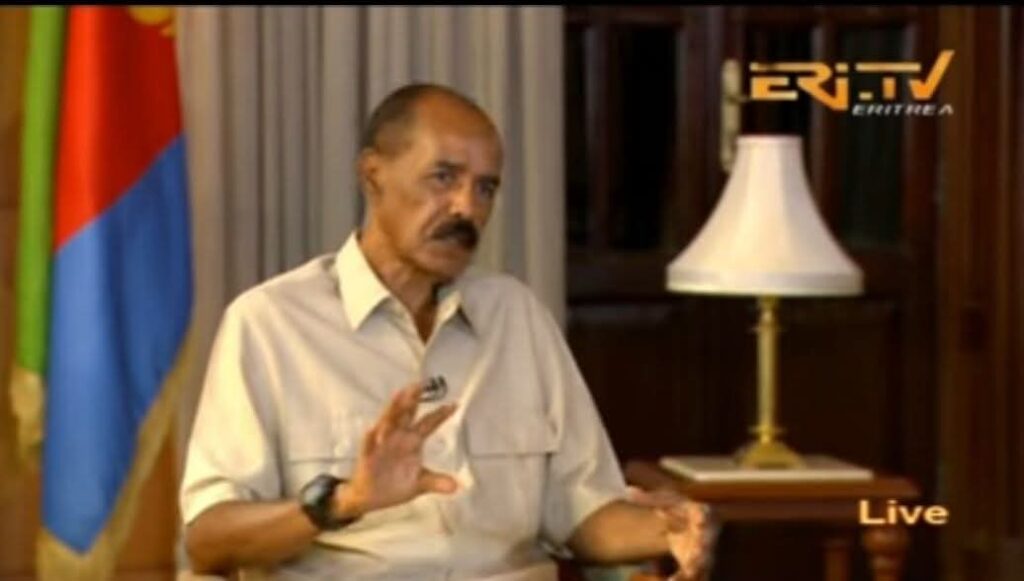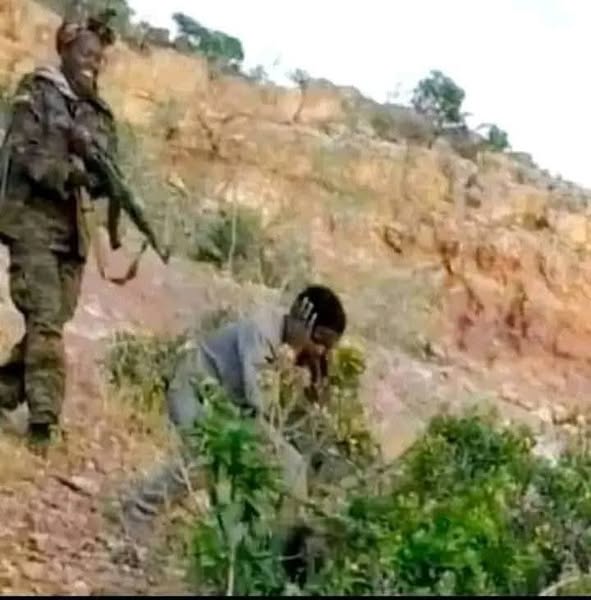Mekelle፡Telaviv, Nairobi, Pretoria, London, (Tigray Herald)
The Last Gasp of a Tyrant
Unmasking the Fear, Delusion, and Decline of Isaias Afwerki’s 34-Year Dictatorship
Executive Summary
In what may prove to be his final and most revealing public appearance, Eritrean strong man Isaias Afwerki delivered a disjointed, belligerent, and paranoid two-hour interview that stunned even longtime observers. Rather than exhibiting leadership, the aging dictator descended intocrude insults and erratic ramblings most notably launching a dehumanizing tirade against Ethiopian Prime Minister Abiy Ahmed, whom he labelled “childish” and “infantile.” In truth, theselabels mirrored his own psychological unraveling and growing fear of regional isolation andinternal revolt.
This address was not a calculated strategic message it was a panic broadcast. Theonce-feared strongman now appeared trapped in a prison of his own making: isolated, paranoid,and unable to adapt to the rapidly shifting geopolitical realities in the Horn of Africa. Thisinterview, far from a projection of strength, may be remembered as a self-authored epitaph of acollapsing regime.
Between the Lines: A Strategic Psychological and Diplomatic Analysis
Language as a Mirror of Collapse
Isaias Afwerki’s language betrayed more than arrogance it revealed desperation. His speech patterns reflected:
Crude Insults & Vulgarity: Rhetoric more common to authoritarian collapse than statesmanship.His language violated diplomatic norms and reflected a retreat into aggression as a substitutefor rational discourse.
Projection & Psychological Deflection: By accusing PM Abiy of immaturity, Isaias projected hisown political regression. This is a classic behavior of autocrats under siege blaming others while evading responsibility.
Paranoid Worldview: The speech was laced with conspiratorial thinking and grandiose narratives. While lecturing about geopolitics, Isaias failed to even mention the sufering of theEritrean people.
Dehumanizing Language: This was not just an insult to foreign leaders it was a strategic tacticto redirect public anger away from his own failures, weaponizing language to reinforce a cultureof fear.
The Message Behind the Madness
Calling PM Abiy “childish” was a deflection born of geopolitical insecurity. It highlighted Eritrea’s marginalization in the Horn of Africa while Ethiopia re-emerges as a key regional actor.Refusing to address Eritrea’s domestic crises revealed a deeper pathology: an authoritarian leader so deep in denial that acknowledging reality would risk unraveling the myth of control.Attacks as Defense: Isaias’ strategy is clear provoke, distract, deflect. But in doing so, heexposed the psychological unraveling of his regime.

The Anatomy of a Failed State: 34 Years of Authoritarianism, Atrophy, and Abuse
Political Tyranny & State Paralysis
No constitution implemented
No national elections since independence (1993)
One-party rule by PFDJ
No free press, judiciary, or civic institutions Indefinite conscription – a system of forced labor disguised as national service
Education System Eviscerated
University of Asmara shut down
No accredited higher education institutions
Schools replaced with military training camps
Mass teacher exodus; academic freedom extinguished
Youth conscripted before completing education
Digital Darkness & Media Blackout
Internet penetration below 1%
No mobile internet access; private newspapers banned
Social media blocked; all communications monitored
Eritrea ranks last globally in press freedom (RSF)Foreign signals systematically jammed
Economic Freefall
No functioning banking system or ATMs
Hard currency tightly controlled by regime elites
Dual exchange rate and extreme inflation
Economic privilege based on loyalty, not competence
No formal budget transparency or development plan
Systemic Human Rights Abuses
Widespread torture, disappearances, and extrajudicial killings
No freedom of religion, speech, or belief
Political prisoners jailed without trial
Lifelong military service; forced labor camps
Eritrea labeled “one of the most repressive states” by UN and Amnesty
Healthcare Collapse
Widespread medical shortages
Hospitals concentrated only in Asmara; rest of the country abandoned
Medical professionals conscripted; emigration of health workers
Mental health services virtually non-existent
Public health strategy absent or obsolete
Youth Exodus & National Depletion
One of the world’s highest per-capita refugee rates
Military deserters branded traitors
Skilled professionals and youth fleeing en masse
Families torn apart; a nation aging without a future
Children raised in exile, detached from their homeland
Surveillance, Repression, and Cultural Death
Total ban on NGOs and independent civil society
Religious institutions controlled or shuttered
Cultural festivals replaced by state propaganda events
Fear-based governance; neighbors spying on neighbors
No independent radio, TV, or community gathering permitted
The Endgame Has Begun
The July 2025 interview may well be remembered as the beginning of the end. With Eritrea increasingly encircled diplomatically, economically, and militarily the pillars of Isaias Afwerki’s totalitarian regime are visibly cracking:
Geopolitical Isolation:
The UAE and Israel, once transactional allies, are shifting priorities. The US, UK, and EU have imposed deeper sanctions and human rights investigations.
Internal Fragmentation:
Reports of dissent within the security apparatus, growing disobedience among youth conscripts, and whispers of factionalism within the ruling PFDJ.
Military Containment:
Ethiopia, Djibouti, and now coordinate containment policies. The launch of the Eritrean Blue Revolution Front (EBRF) signals a new era of organized resistance.
Diaspora Mobilization:
Eritrean exiles across Europe, North America, and East Africa have intensified eforts to challenge the regime’s legitimacy and prepare for democratic transition.Isaias, now 79, stands not as a revolutionary hero but as a cautionary tale clinging to power through cruelty, secrecy, and denial while his people sufer in silence.
Words That Define a Failed Legacy
“Childish”: Ironically revealing of his own governance style emotional, erratic, and ungroundedin institutional maturity.“Infantile”: A term that more accurately applies to a man unable to evolve, leading a nation intoperpetual immaturity.“Lecturing the world”: While Eritrea descends into ruin, Isaias ofers unsolicited advice to powersfar more functional than his own.
Strategic Insight:
When a Tyrant Speaks, Listen Closely History reminds us: tyrants often speak most clearly in their final days not through truth, but through break down. Like Mugabe in Zimbabwe or Gaddafi in Libya, Isaias now represents a regime at war with its own survival instincts.Insults signal insecurity, not confidence.Fear-driven rhetoric invites resistance, not loyalty.Political incivility hastens downfall, not longevity.
Strategic Recommendations for Regional & Global Actors
- Accelerate multilateral diplomatic pressure for an Eritrean democratic transition through AU,UN, and IGAD mechanisms.
- Use public interviews and speeches as evidence of psychological unfitness for leadership and incitement of political violence.
- Expand targeted sanctions on senior PFDJ oficials and financial enablers complicit inrepression and traficking.
- Support Eritrean defectors and civil society, including religious leaders, doctors, and youth asvital actors in national rebuilding.
- Establish early-warning and transition monitoring systems, preparing for regime collapse andpost-Isaias stabilization planning.
Final Reflection
“Eritrea under Isaias Afwerki has not been a country it has been a political prison masquerading as a state. A tragedy of wasted potential, stolen futures, and sufocated voices.The end of this dictatorship is no longer a question of ‘if’ but ‘when,’ and ‘how.’”A Warning from History Like other fallen tyrants Idi Amin, Gaddafi, Mugabe Isaias Afwerki’s reliance on insults,repression, and psychological warfare signals the twilight of his dictatorship.
The world must prepare for a post-Isaias transition and ensure it is driven by justice, inclusion, and the voices ofthe Eritrean people.
Prepared byHorn of Africa Geopolitical Review (HAGR)In collaboration with regional security experts, exiled Eritrean intellectuals, conflict analysts, andinternational human rights observers.




